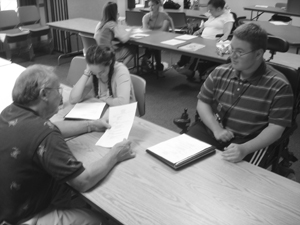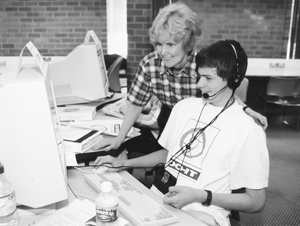Chapter Seven
Understand Your Abilities and Disabilities. Play to Your Strengths.
The best way to prepare for life is to begin to live.
— Elliot Hubbard —

Understanding yourself provides the foundation for taking self-determined actions. It is a key to success. To know yourself means to be aware of strengths, weaknesses, needs, interests and preferences. Self-awareness is essential for developing goals that reflect personal desires and for making informed decisions. Valuing yourself leads to positive self-esteem. The belief that you are part of something larger and more enduring than daily struggles can provide the strength required to persevere when life presents its inevitable challenges.
You can help young people gain an understanding of their abilities and disabilities and then learn to play to their strengths. This knowledge and skill can contribute to a successful life. For example, one successful college student who had a stroke at a young age wrote:
One example of how I understand my abilities and disabilities is that as much as I love science, I am more socially inclined. When I entered college I wanted to do biology and become a doctor or something to help people. When biology did not work out I switched to speech therapy, but that did not work either (even that was heavily science-based). Finally, many people told me that I should try counseling, so now I am in social work with the end goal of counseling and it is working out great for me. I know there are many different things I can do as a social worker that will all involve counseling.
In studies of childhood risks and adversities it has been found that young people can minimize the effects of disabilities and other risk factors by "learning to see one's adversities in a new light" (Katz, 1997). Successful individuals who overcome adversities are often able to define themselves more around their multiple talents than around their areas of vulnerability. Being able to show their talents and have them valued by those who are important to them helps them define their identities around that which they do best. It has even been found that children's perceptions of their competence are stronger predictors of behavior and achievement than objective measures of their capabilities (Phillips & Zimmerman, 1990).
How society labels individuals with disabilities as a group can also have an impact on how young people with disabilities view themselves. Responding to labels can test self-identity and self-value. Mentors can play a key role in shaping the self-perceptions of young people.
People with disabilities who consider them-selves successful generally accept their disabilities as one aspect of who they are. They do not define themselves by their disabilities. They recognize that they are not responsible for their disabilities, and they know that they are not inherently impaired. They do not blame others for their situation, nor do they have a sense of entitlement. Instead, they take responsibility for their own happiness and future.

After completing the online activities in this chapter, young people will reach a greater understanding of their abilities and disabilities. These exercises will help students to:
- know their strengths and weaknesses
- understand their rights and responsibilities
- know that their disabilities do not define them as individuals and have a limited impact on their lives
- define their self-worth in terms other than the stereotypes of others
- have high self-esteem
- know their lives have meaning
- make positive contributions to their families, schools, and communities
The e-mentoring community administrator can select appropriate messages from the following examples and send the Mentor Tip messages to the mentors only and the E-Community Activity messages to the entire online mentoring community. Use these examples to stimulate other ideas for online discussions. It is desirable that, ultimately, most discussion topics come from the mentors and protégés.